Until Dawn PS4 Review: Choose Your Own Horror Movie
Supermassive Games hands you control over the lives of scared twentysomethings.
This article first appeared on USgamer, a partner publication of VG247. Some content, such as this article, has been migrated to VG247 for posterity after USgamer's closure - but it has not been edited or further vetted by the VG247 team.
Do you like horror movies?
You may not have heard of Supermassive Games before. The studio previously worked on PlayStation peripheral titles, like the Move-specific Tumble and Start the Party or the Wonderbook title Walking with Dinosaurs. Until Dawn marks the studio's first standalone AAA title, leaving behind the family-friendly nature of previous projects to tell a full-on Rated-R horror tale.
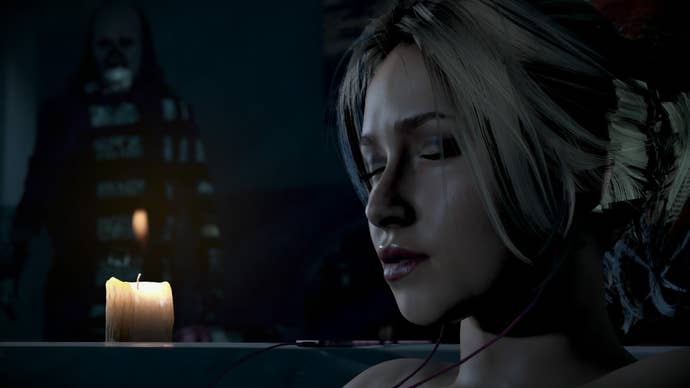
Until Dawn tells the story of eight twentysomethings who return to the Blackwood Mountain Ski Lodge a year after two of their friends, twin sisters Hannah and Beth, go missing. Sam, Mike, Ashley, Chris, Matt, Emily, and Jessica were all somewhat responsible for Hannah and Beth being in a position to go missing in the first place, so the entire group carries a certain amount of guilt. The twins' brother Josh invites the entire crew back up to the family cabin and everyone begrudgingly returns to help him move on. Why did Hannah and Beth go missing and is whatever took them still out there in the woods?
The answer is, of course it is. This is a horror game. Well, "game" will be a bit strong for some players. Until Dawn is more in line with current Telltale-style adventure games, albeit with less puzzles and a big-budget presentation. In discussing how to classify adventure games of this type, a friend of mine came up with the genre label "choice adventure", which is largely what Until Dawn is. You wander around the environment of Blackwood Mountain, making choices and completing quicktime events. Outside of those timed events, Until Dawn isn't really going to tax you. But that's not really the point.
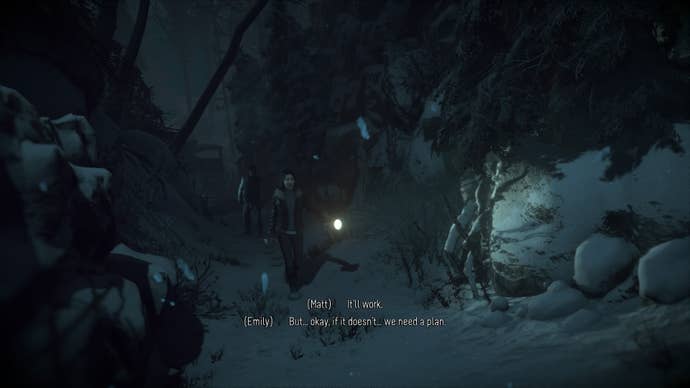
This is why the question I asked at the beginning of this review is important. If you like horror movies, then you know that feeling, when you're straining against your seat going, "No, you idiot, go that way! You're going to get yourself killed!" Until Dawn leaves those choices up to you. Sure, the characters will still do things that make no sense - why are you yelling "Who's there"? Shut the hell up if you want to live! - but you have control over their major decisions. Supermassive calls it the Butterfly System, where each choice and action causes your personal version of Until Dawn's tale to diverge and split off from everyone else's.
I played through a few times and the differences can be significant. My first playthrough, I cruised through with only a single death by simply obeying the laws of horror movie common sense. For the death that occured, I knew I made the wrong choice as soon as I did it. Others I spoke to had completely different experiences, as did I the second and third times through. A big part of Until Dawn's community will be sharing the various changes inherent in everyone's playthrough.
The first time you play Until Dawn, it's a straight shot. You experience the story from beginning to end, with each chapter punctuated by a recap and a scene with mysterious psychiatrist Dr. Hill interviewing a figure connected to the events at Blackwood. The game auto-saves for you, so there's no jumping back to redo any choice. Once you make a decision, that's it. Supermassive made a good decision here, as it adds more weight to each choice. Once you've cruised through your canon run though, the game gives you the option to jump back to specific chapters, so you can play around with permutations of the plot.
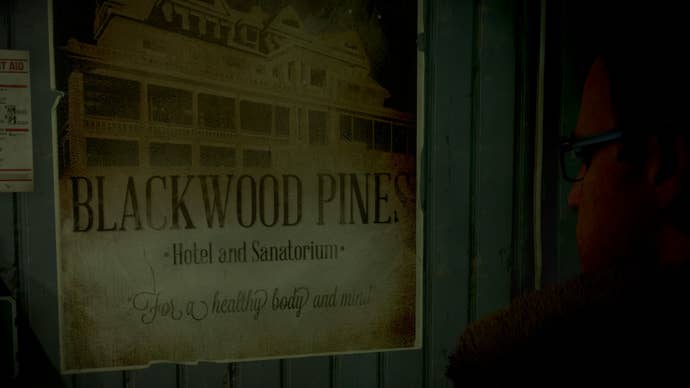
Start to finish, Until Dawn is a straight horror film. It has the slasher setup - X number of people trapped in a remote destination - but it plays around with a number of different horror tropes before settling on its true focus. Is the group dealing with a masked psycho? A vengeful spirit? Or something else? That's part of the mystery that the games teases out over time. Until Dawn is good at keeping things tense and suspenseful, even if it's not always scary. There's also various clues you can find and collect that fill in the backstory or totems that give you glimpses of potential futures. In the end, this is more of an interactive drama. As a horror movie, Until Dawn is pretty good. I would watch my version in a movie theatre.
The "movie" feel is enhanced by the performance capture. Every character is portrayed by a real actor, with the cast headlined by Nashville star Hayden Panettiere, Agents of SHIELD star Brett Dalton, and the always-magnetic Peter Stormare as Dr. Hill. The performance capture breaks down a bit here and there, with the occasional face that doesn't look right, but for the most part, the effect works. Until Dawn overall looks positively stunning, especially when it comes to lighting. The scenery feels real, with light and shadow playing off every surface. The PlayStation 4 does its best to stand up to the task, but the framerate does buckle and shudder.
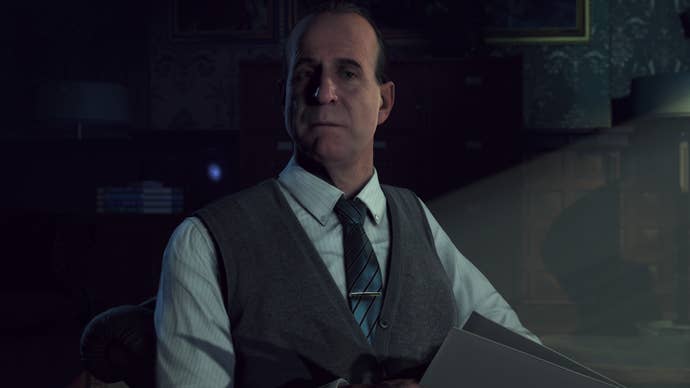
Until Dawn was previously a PlayStation 3 title with Move support and the last vestiges of that choice still remains in the final title. You can choose traditional or motion controls, with the major difference being that you either tilt the analog stick or the entire controller to make decisions or handle items. One motion mechanic that works really well requires you to hold the controller perfectly still, keeping an icon that resembles the Dual Shock 4 lightbar within a certain area. It's rather genius, making the player feel the same tension the character onscreen is feeling.
What I respect about Until Dawn is its focus. I finished my first run through in around 7-8 hours. You could probably get that down to 6, bringing the game within TV miniseries territory. That's long enough to feel satisfying, but short enough that playing it again and making different choices isn't a daunting task. The game doesn't set out to revolutionize storytelling like a Quantic Dream title, it just tells a good, straight-forward story. I appreciate that.
If I quibble with it at all, it's when my sense of value enters the picture. I like Until Dawn, but I question if it's worth the full $60. The comparison to Telltale's $20 titles or Life is Strange is pretty easy to make, but I'm assuming Sony expects players who were willing to pay full price for similar interactive dramas like Heavy Rain and Beyond: Two Souls to shell out for this title. (For what it's worth, I had the same value conundrum with those games as well.) My personal price point would probably be around $40.
Despite that, I recommend horror fans try out Until Dawn. I enjoyed it, even if it didn't set out to be the best horror game ever. It told a solid horror tale and once I finished, I could jump back back and try out some other versions of the story. Even just talking out the differences between my playthrough and a colleague's was satisfying and I think that's where Until Dawn will find some mileage. Honestly, I want to see more interactive horror from Supermassive. Not as a sequel to the story here or with this cast again, but a new cast in a new setting? I'd be completely down for that. So if you dig horror, try out Until Dawn. Supermassive deserves to make more.
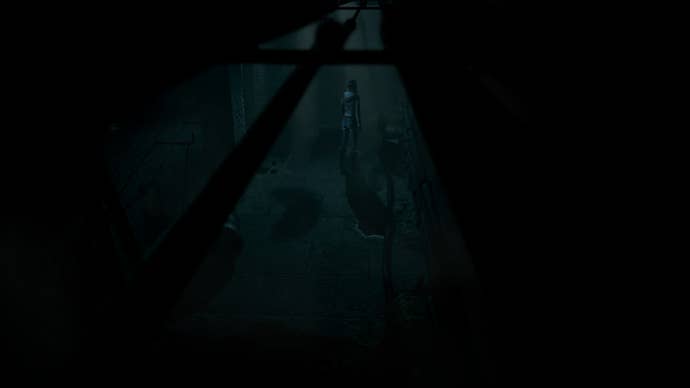
Lasting AppealOnce you've done a couple of runs, you're probably done with Until Dawn. You can find all the collectibles, but that's probably for completionists only.
SoundThe sound designer deserves kudos for keeping the tension high. Horror without sound just isn't horror.
VisualsUntil Dawn looks great, though the performance capture looks off occasionally and the frame rate can shudder a bit.
Why Can I Kill You?I just wanted to kill Emily from the very beginning. It's like she fought me to survive.
ConclusionUntil Dawn is a horror movie where you control the plot. Think of it like a Telltale adventure with a much better presentation. If you're looking for a deeper, more interactive title, this isn't it, but it does its best to make your choices feel meaningful. And once you've played Until Dawn, comparing your story with your friends' is pretty satisfying.









